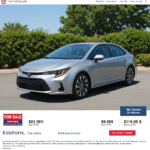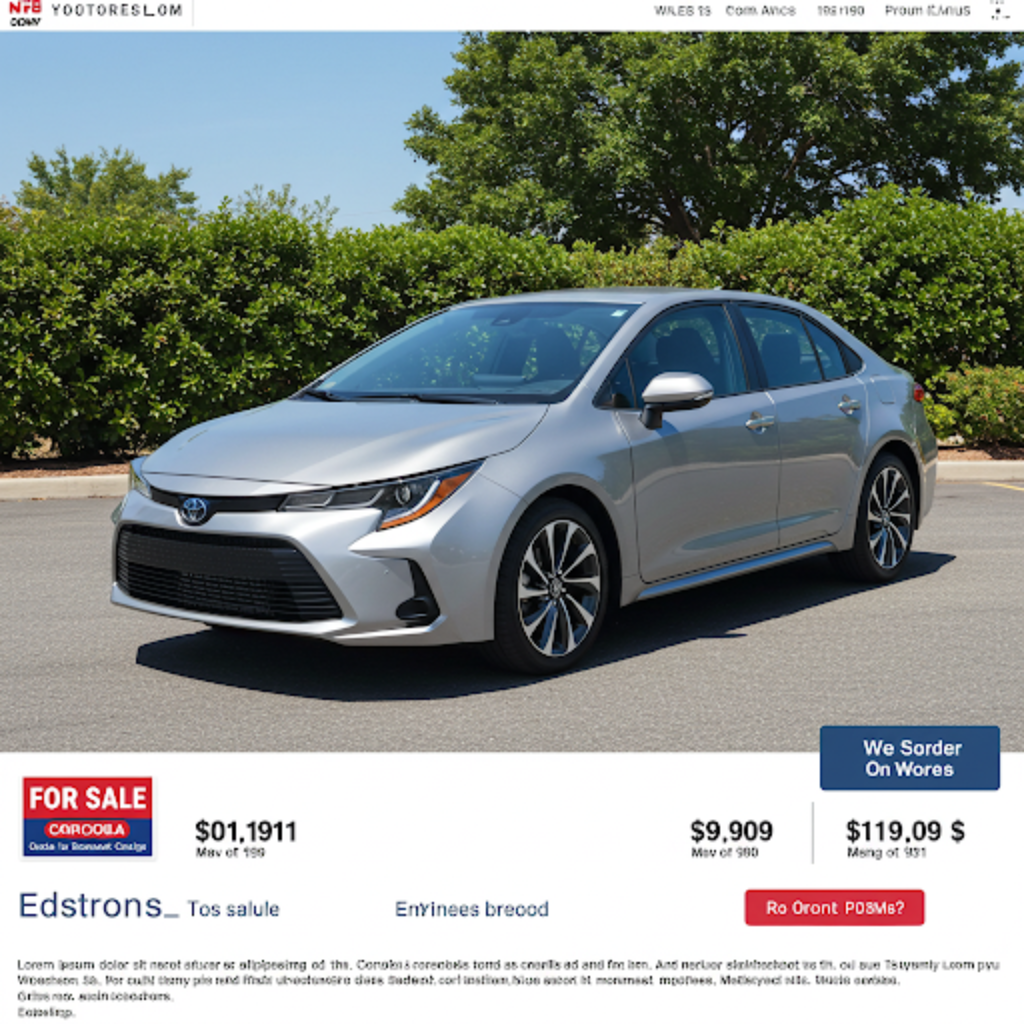
Toyota Corolla: A comprehensive guide to buying a used model
The Toyota Corolla is practically synonymous with reliability, fuel efficiency, and affordability. It’s a car that has consistently topped sales charts for decades, and for good reason. Buying a used Corolla can be a smart move, offering significant savings compared to purchasing new, while still providing years of dependable service. This comprehensive guide will delve into everything you need to know about buying a used Toyota Corolla, covering various generations, common issues, price expectations, and tips for making a sound purchase.
Why choose a used Toyota Corolla?
The Corolla’s enduring popularity isn’t accidental. Several factors contribute to its appeal as a used car:
- Reliability: Toyota has a well-earned reputation for building cars that last, and the Corolla is a prime example. With proper maintenance, it’s not uncommon to see Corollas exceeding 200,000 miles.
- Fuel Efficiency: Corollas are consistently among the most fuel-efficient non-hybrid cars on the market. This translates to significant savings at the pump over the car’s lifespan.
- Affordability: Both the initial purchase price and ongoing maintenance costs for Corollas are generally lower than many competitors. Parts are readily available and relatively inexpensive.
- Resale Value: Corollas hold their value remarkably well. This means you’ll likely recoup a good portion of your investment when you eventually decide to sell.

- Safety: While older models may lack some of the latest advanced safety features, Corollas have consistently performed well in safety tests throughout the years. Newer used models often include features like lane departure warning and automatic emergency braking.
- Simplicity: The Corolla is generally straightforward mechanically, meaning that it’s often easy to perform basic and more advanced maintenance.
Understanding Corolla generations: A buyer’s timeline
The Corolla has been around for a long time, and understanding the different generations is crucial for finding the right used model for your needs and budget. Here’s a brief overview of the most recent generations likely to be found on the used market:
- Ninth Generation (2003-2008): Known for its excellent fuel economy and rock-solid reliability. These models are typically very affordable, but may lack some modern features. Look for potential oil consumption issues in some model years.
- Tenth Generation (2009-2013): A slight redesign from the previous generation, offering a bit more interior space and updated styling. Still very reliable and fuel-efficient. Watch out for potential excessive oil consumption, especially in earlier model years.
- Eleventh Generation (2014-2019): A more significant redesign, with a more modern and stylish exterior and interior. This generation saw improvements in fuel economy and the introduction of more standard safety features. This is a very popular generation on the used market.
- Twelfth Generation (2020-Present): The current generation Corolla boasts a sharper design, improved handling, and even better fuel economy, thanks to a new platform and engine options. These are newer on the used market, so expect to pay a premium compared to older generations. Also available as a hatchback and a hybrid.
Common issues to watch for (and how to spot them)
While generally very reliable, no car is perfect. Here are some potential issues to be aware of when shopping for a used Corolla, particularly in specific generations:
- Excessive Oil Consumption (2003-2011, especially 2009): Some Corollas from these years, particularly those with the 1.8-liter 2ZR-FE engine, have been known to consume excessive amounts of oil. Check the oil level frequently during a test drive and ask the seller about oil consumption history. Look for blue smoke from the exhaust, which can indicate burning oil.
- Sticky Dashboard (2003-2008): In some warmer climates, the dashboards of these Corollas can become sticky and gooey. This is a cosmetic issue, but it can be annoying. Check the dashboard carefully for any signs of stickiness or melting.
- Water Pump Failure: Water pump failure can occur in any car, but it’s worth checking the coolant level and looking for any signs of leaks around the water pump, especially in higher-mileage Corollas.
- Automatic Transmission Issues (Less Common): While the Corolla’s automatic transmissions are generally reliable, some owners have reported issues with shifting, particularly in older, higher-mileage vehicles. Pay attention to how smoothly the transmission shifts during a test drive.
- Airbag Recalls: Like many vehicles, some Corollas have been subject to airbag recalls. Check the vehicle identification number (VIN) on the National Highway Traffic Safety Administration (NHTSA) website to see if there are any outstanding recalls.
Inspecting a used Toyota Corolla: A step-by-step guide
A thorough inspection is crucial before purchasing any used car, and the Corolla is no exception. Here’s a checklist to guide you:
- Exterior:
- Check for rust, especially around the wheel wells, rocker panels, and undercarriage.
- Look for dents, scratches, and mismatched paint, which could indicate previous accidents.
- Inspect the tires for uneven wear, which could indicate alignment or suspension problems.
- Check all lights and signals to ensure they are working properly.
- Interior:
- Check the condition of the seats, upholstery, and carpets.
- Test all power windows, locks, and mirrors.
- Turn on the air conditioning and heater to ensure they are working correctly.
- Check the dashboard for warning lights.
- Inspect the dashboard for any signs of stickiness or damage (especially in older models).
- Under the Hood:
- Check the oil level and condition. Look for any signs of sludge or contamination.
- Check the coolant level and look for any leaks.
- Inspect the belts and hoses for cracks or wear.
- Listen for any unusual noises when the engine is running.
- Test Drive:
- Pay attention to how the engine starts and runs.
- Listen for any unusual noises, such as knocking, squealing, or grinding.
- Test the brakes to ensure they are responsive and stop the car smoothly.
- Pay attention to how the transmission shifts (if automatic).
- Drive the car on a variety of roads, including highways and city streets.
- Try parking the car, make sure that the steering wheel turns with ease.
- Vehicle History Report:
- Obtain a vehicle history report using the VIN. This report can reveal important information, such as accident history, title issues, and ownership records. It is best to obtain the most detailed report.
- Pre-purchase Inspection:
- If possible get an inspection from a trusted independent mechanic. This is the best way to identify any potential problems that you might miss.
Pricing expectations: What to pay for a used Corolla
The price of a used Corolla will vary depending on several factors, including:
- Year and Generation: Newer models will generally command higher prices.
- Mileage: Lower-mileage vehicles will typically be more expensive.
- Condition: Vehicles in excellent condition will fetch a premium.
- Location: Prices can vary depending on your geographic location.
- Trim Level: Higher trim levels (e.g., LE, XLE, SE) will be more expensive than base models.
- Seller Type: Dealerships usually price their vehicle with bigger profit, compared to private-party sellers.
As a general guideline, you can expect to find older Corollas (2003-2008) for under $5,000, while newer models (2014-2019) can range from $8,000 to $18,000 or more, depending on the factors listed above. The current generation (2020-present) will typically be priced higher, reflecting their newer age and features. Use online pricing guides and check local listings to get a sense of fair market value in your area.
Negotiating the best deal
Don’t be afraid to negotiate the price of a used Corolla. Here are a few tips:
- Do your research: Know the fair market value of the vehicle you’re interested in.
- Be prepared to walk away: Don’t get emotionally attached to a particular car.
- Point out any flaws or issues: Use any identified problems as leverage to negotiate a lower price.
- Make a reasonable offer: Start with a lower offer than you’re willing to pay, but don’t go too low.
- Be polite and respectful: Maintain a positive attitude throughout the negotiation process.
Financing and insurance
Before you start actively looking at cars, check your credit score. Consider getting pre-approved for an auto loan. This will give you a better idea of your budget and interest rate. Also don’t forget, that you will need to get a car insurance. Insurance costs can vary depending on your age, driving history, location, and the specific Corolla model you choose. Get quotes from multiple insurance companies to compare rates.
Final thoughts: A smart choice for used car buyers
The Toyota Corolla has earned its reputation as a reliable, fuel-efficient, and affordable car. Buying a used Corolla can be an excellent way to get a dependable vehicle without breaking the bank. By understanding the different generations, common issues, and inspection procedures, you can make an informed decision and enjoy years of trouble-free driving. The key is to do your homework, be patient, and don’t be afraid to walk away if something doesn’t feel right. A well-maintained used Corolla can be a fantastic value and a smart investment.






